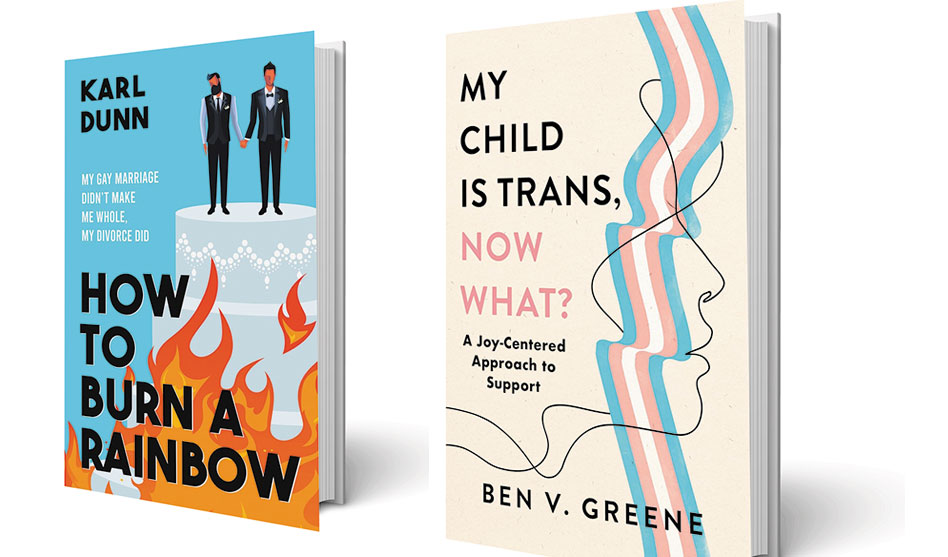New books address how to be an ally to your trans child, how to survive same-sex divorce
DAVID TAFFET | Senior Staff Writer
taffet@dallasvoice.com
Authors Ben Greene and Karl Dunn have advice on topics rarely talked about in the LGBTQ community: being an ally as a parent to a trans child, and same-sex divorce.
Dunn said that when he was looking for a book on same-sex divorce, he couldn’t find one. So he wrote his own. And Greene is a trans man who has advice for parents of trans kids on how to be an ally and a good parent to their trans child.
Greene’s new book — My Child is Trans, Now What? — offers advice to parents of trans youth. On discussing gender marker and legal name changes, Greene says, “I was seriously considering joining Cirque du Soleil because of how good I’d gotten at jumping through hoops.”
In his chapter on a child or teen coming out as trans to their parents, Greene ends with a list of joy exercises to celebrate coming out. More than any other, his first suggestion is loving, simple and silly — and my favorite: Buy a cake with rainbow icing. For a parent who just doesn’t know where else to turn or what else to do, buying their child a cake is something they know how to do. And can you think of a better way to bring a smile to the face of a child or a better way to say I love you than with a sweet, colorful cake?
That’s the type of advice Greene gives — clear and simple, useful and easy to follow since it arises out of parents’ love for their children.
His discussion of pronouns is equally direct and simple as he dismisses the idea of “preferred pronouns.” He substitutes it with the idea of using “correct pronouns.” If you’re ordering a pizza for delivery, he suggests, would you feel very confident it would be delivered to a “preferred address?” Give your correct address to assure proper delivery and use your correct pronouns rather than some suggestion.
His advice on dealing with hateful family members is something we can all use, whether it’s trans issues, homophobia, racism or other objectionable speech. Too often, that person’s transphobia is dealt with by brushing it off saying, “That’s just Grandma,” Greene writes. But, he advises, “Love is what makes a family, and if someone is bringing hate or malice to your Thanksgiving table and not facing any consequences, that person is not family.”
That is good advice for us all to follow.
He says when people don’t face social repercussions, it gives them permission to continue being hateful. Don’t encourage that bad behavior.
Greene’s bits of advice are valuable ideas for parents who want their transgender kids to be happy. Among them is to find ways for the child to “learn about, see, or meet older members of the LGBTQ community who share their identity or interests to show them positive possibility models.”
While Greene’s book is written as an advice book, Dunn simply tells his story.
Dunn said when he knew he needed to get divorced, he looked for a book on same-sex divorce and couldn’t find one. So he wrote his own. How to Burn a Rainbow is that book. His subtitle is, “My gay marriage didn’t make me whole, my divorce did.”
While nothing much has been written on same-sex divorce, plenty has been written about our relationships. In one survey Dunn quotes, couples in a relationship for less than 15 years said communication was the most important thing for them. But those together longer said respect was crucial. He suggests lack of communication and respect are indications your marriage is not going in the right direction.
Dunn describes his “crisis of identity” and the feeling he had let down the entire LGBTQ community with his divorce.
One of the most sobering lessons he learned was how expensive a divorce can be. Dunn and his husband lived in California which is, like Texas, a community property state. Although Dunn earned more than twice as much as his husband, their assets were evenly divided between them.
And unlike Texas, California has alimony. So in addition to savings lost, Dunn owed his ex-husband a monthly check.
Once the judge in their case ruled Dunn was responsible for his husband’s attorney’s fees as well as his own, his husband and husband’s attorney were in no rush to settle. And the bills related to their divorce kept climbing.
Dunn includes an interesting discussion of “loneliness vs. aloneness.” He says, “If I was ever with someone again, I wanted it to be because I wanted them, not because I needed them. And also, I wanted to not have to be with anyone; I could be perfectly happy with just me.”
Some statistics he gives are that 64 percent of Americans go through the breakup of a long-term relationship in their lives. And 90 percent of employees say that when they went through a divorce, their work was adversely affected. While there’s maternity leave and bereavement leave, there isn’t divorce leave for someone going through a traumatic personal event.
The lesson to be learned from this book is that divorce is difficult, but things get better. Dunn ends his story saying, “I’d always thought this book would end with a great Hollywood moment.”
Maybe his ex would contact him and apologize? Or would he be dating?
No, instead it ends with “a tiny moment.”
He writes, “A man I liked said, ‘No, thanks,’ and my world didn’t change one bit.”


